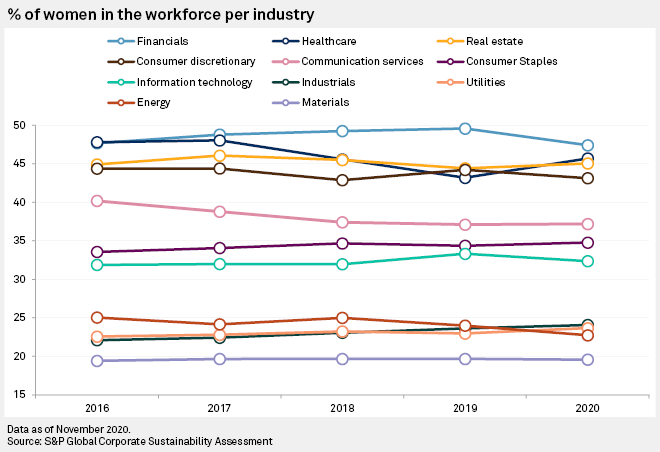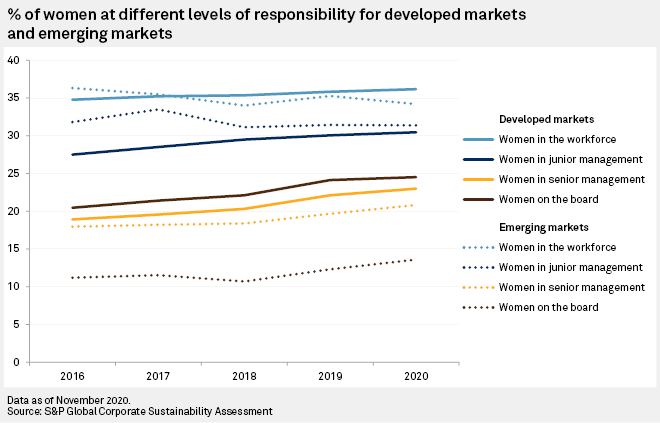S&P Global Offerings
Featured Topics
Featured Products
Events
S&P Global Offerings
Featured Topics
Featured Products
Events
S&P Global Offerings
Featured Topics
Featured Products
Events
Banking & Capital Markets
Economy & Finance
Energy Transition & Sustainability
Technology & Innovation
Podcasts & Newsletters
Banking & Capital Markets
Economy & Finance
Energy Transition & Sustainability
Technology & Innovation
Podcasts & Newsletters
S&P Global Offerings
Featured Topics
Featured Products
Events
2 Mar, 2021
Governments need to enact reforms ensuring gender equality is a priority in their coronavirus recovery plans, and a lack of gender equality in laws and regulations worldwide comes at a cost for the economy generally, according to a new report by the World Bank.
In its Women, Business and the Law 2021 report, the World Bank said despite greater gender equality globally, women still face legal systems restricting their economic mobility, a factor compounded by the COVID-19 pandemic.
"The urgent need for reform is even more glaring today because the COVID-19 pandemic has widened the long-existing gender pay gap," the report said.
The report comes at a time when social issues such as gender parity and the way companies treat their employees are receiving heightened attention from investors and the corporate world. In his annual letter in January, BlackRock Inc. top executive Larry Fink asked CEOs to disclose their long-term plans to improve diversity, equity and inclusion. State Street Global Advisors Inc. said it expects all companies in its portfolio to publicly articulate the role that race and gender diversity play in their broader human capital management practices and long-term strategy. And in late 2020, stock exchange giant Nasdaq Inc. proposed requiring listed companies to have at least one director who identifies as a woman and another who is Black, Hispanic, Native American, LGBTQ+ or part of another underrepresented community.
Policymakers, too, are focused on these issues. Earlier this year, Germany passed legislation introducing a minimum quota for women on the boards of large listed companies. In the U.S., President Joe Biden's economic relief package included proposals to bolster safety regulations for workers and expand the amount of paid sick, family and medical leave workers can receive.
The issue is important now as women are more susceptible to the pandemic's impacts and more likely to resign or take time off to look after their children due to illness or school closures, the World Bank said; even if they keep their position, they are at a higher risk of losing earnings.
Prior to the pandemic, less than a quarter of the 190 countries surveyed in the report legally guaranteed parents time off for childcare. While an additional 40 economies, except in East Asia, the Pacific and South Asia, have introduced childcare leave or policies designed to help parents, "these measures are likely insufficient to address the challenges many working mothers already face, or the childcare crisis," the report found.
Women represent 39% of the global workforce but accounted for 54% of pandemic-related job losses as of May 2020, according to a report from the Harvard Business Review. Women are overrepresented in sectors most heavily hit by the pandemic, such as hospitality or the food services industries, further exacerbating inequalities, according to the latest S&P Global Corporate Sustainability Assessment, an annual evaluation of more than 7,300 companies' sustainability practices across the globe.


Legal rights lacking
On average, women have just three-quarters of the legal rights afforded to men, according to the World Bank study, which measured women's legal rights with regards to mobility, the workplace, pay, marriage, parenthood, entrepreneurship, assets and pensions in 190 countries between September 2019 and October 2020. Ten economies — Belgium, Canada, Denmark, France, Iceland, Ireland, Latvia, Luxembourg, Portugal and Sweden — scored 100 on the report's Women, Business and the Law index, while the West Bank and Gaza, the Republic of Yemen, Kuwait, Sudan and Qatar had the lowest scores, ranging from 26.3 to 29.4.
Since 2019, 27 countries enacted reforms increasing gender equality, including 30 days of paid paternity leave in Austria, a ban on women's night work in Costa Rica and permission to apply for a passport in the same way as men in Jordan. But while most of the reforms affected pay and parenting, the latter is the area that needs the most improvement, including strengthening laws on paid parental leave and prohibiting the dismissal of pregnant women. Governments also need to address restrictions women face in the kind of work they can do because they often take on lower paid jobs. In 100 economies, there are no laws requiring women and men to be paid equally for the same jobs, the report said.
The study pointed out the economic benefits of childcare, noting the productivity losses for parents missing work to care for children "come with a price tag."
For example, it cited a study by its private-sector financing arm International Finance Corp. advocating employer-supported childcare in Fiji, which found that staff missing work to look after children was costing the private sector on average $254,000 annually, or $460 per employee.
Parents leaving the labor market to care for children lose wages and have lower retirement benefits, while low-income families are limited in how much they can pay for childcare, according to the World Bank. Between 43 million to 53 million childcare providers are needed to meet the gap for childcare globally, with poorer countries accounting for nearly 80% of that gap, it estimated.
Increased public spending on better quality childcare would help young children succeed at school and then in the workplace as a result, with better jobs and leading to higher tax revenues.
Corporate leave policies in the U.S. evolving amid COVID-19
Family leave policies in the U.S. lag the rest of the developed world. The U.S. is the only country within the Organization for Economic Cooperation and Development that does not offer nationwide, statutory, paid family leave of any kind, whether it be maternity leave, paternity leave or parental leave, according to a 2019 UNICEF report on family-friendly policies.
While a number of states have enacted paid family leave laws during the pandemic, the U.S. private sector has largely taken the lead in such policies in the absence of federal mandates, 2020 research by S&P Global found. Many parents and family caregivers have seen their at-home commitments grow since the pandemic began, leading to increased stress and some feeling that they were being penalized at work for their increasing responsibilities, according to an S&P Global/AARP survey of nearly 1,600 people conducted in the late summer of 2020. With many schools and daycares closed and with many children moving to virtual learning environments, the amount of time required for childcare duties since the pandemic began has increased for 58% of parents, according to the survey results.
In the face of these challenges, the S&P Global/AARP research found that flexible hours and work arrangements appear to help with retention of employees. Turnover is lower when companies have flexible hours and location options, according to our analysis of data from S&P Global's Corporate Sustainability Assessment and Equileap, a provider of gender-equality data and insights.
In this episode of S&P Global's ESG Insider podcast we explore how the pandemic has impacted women in particular and the ways that companies are evolving their leave policies in response. Listen on SoundCloud, Spotify or Apple podcasts.
'Justice gap'
The World Bank report also highlighted the cost that unequal access to judicial systems imposes on governments. This "justice gap" is "still rampant" for women due to lower literacy rates, incomes and other biases such as social stigma and psychological trauma in bringing claims, and that in turn requires higher public spending on unemployment benefits, social assistance and health services.
The report cited the case of Canada, where unmet legal needs cost the state C$800 million annually in healthcare costs, social assistance payouts and employment insurance payments. It also referred to recent studies in the U.S. estimating funding for legal services could return 11 times the amount invested by reducing public expenditure and generating income. A mother receiving child support will not require public benefits, while a woman suffering domestic abuse who receives a restraining order will miss fewer days of work and thus gain more income, the report estimated.
"Such savings can drive millions of dollars into a local economy and empower women to provide for themselves and their families."

